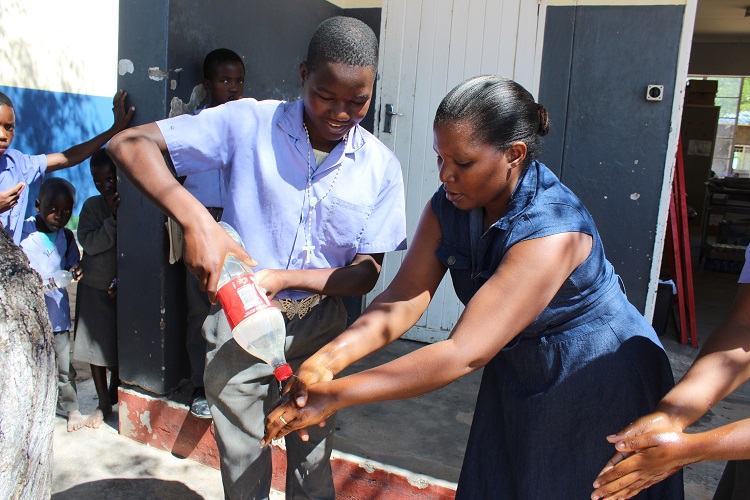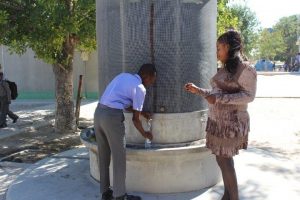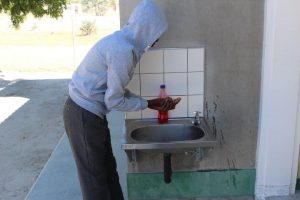
SCHOOL-BASED WATER, SANITAITON AND HYGIENE (WASH) INITIATIVE
School-Based Water, Sanitation and Hygiene (WASH) initiative
“I really thank this WASH program for teaching us the basic things about how we as girls can handle our menstruation and to understand how our bodies work. I started with my periods last year and I did not really know much about it at that time. It somehow came as a surprise. Because of this program, we also now can be given pads at school in case if menstruation starts and the girl did not have any pads with her.”
14 year old girl, Bagani Combined School, Kavango East region, 2016
With support from UNICEF, the interventions on Water, Hygiene and Sanitation (WASH) was implemented in close collaboration with the Ministry of Education, Arts and Culture and the multi-sectoral support from the Water Sanitation and Hygiene in School (WinS) steering committee. The project was implemented in March 2015 – April 2016 in 100 schools across 7 regions namely, Zambezi, Kavango West, Kavango East, Ohangwena, Omusati, Oshana, and Oshikoto. Although funding for this initiative ceased in 2016, SFH continued to follow up with selected schools to ensure that hygiene conditions and practices and maintained.
The project was designed to address needs identified based on a Needs Assessment on WASH in schools led by SFH and partners in 2013/14 which found that one quarter (25%) of the total number of 420 schools surveyed have water piped into the school buildings. Other findings were summarized as follow:
- Non-existent or insufficient water supply, sanitation and hand-washing facilities in some schools;
- Toilets or latrines that are not adapted to the needs of children, in particular girls;
- Broken, dirty and unsafe water supply, sanitation and hand-washing facilities in some schools;
- Children with poor hygiene and hand-washing practices.
Why working with school learners on basic hygiene and sanitation is essential:
- Children are eager to learn. Schools can stimulate and support positive behavioural change in children.
- Children have important roles in household chores related to hygiene.
- Children may question existing practices in the household and become agents of change within their families and communities.
- Children are future parents. What they learn at school is likely to be passed on to their own children.
The overall goal of the project was to promote hygiene and sanitation practices in schools with the objectives to:
- To increase awareness and political support to improve WASH situation in the target regions through advocacy, communication and mobilization.
- To ensure that circuit inspectors, principals and teachers have a basic understanding of WASH concept and how it affects learning and health of learners.
Project Conceptualisation
The 100 participating schools were drawn from 7 regions as follow: Omusati region (17), Ohangwena region (17), Kavango East (18) and West (15) region, Zambezi region (17), Oshana region (9) and Oshikoto region (7). These are the regions with low performing indicators on sanitation, safe water supply and prone to floods. 47 schools among the 100 schools were previously supported through the MCA-N WinS project.
At school level, community facilitators provide a series of “mini workshops/sessions” to the WASH club members and surrounding communities on the importance of WASH and how to design different activities to attract the attention of other learners.
Schools have established WASH clubs, that consist of at least 25 learners linked to the focal teachers and their primary duty was to promote WASH activities at the school level. This is carried out through WASH information sharing, performance of songs, drama, and holding cleaning campaigns in schools. These activities created awareness and drew larger groups of learners to the WASH club events.
Training materials
Participants, were trained on the content of the WASH Training Guide for Teachers and how to use it. The purpose of the
Guide is to assist teachers in promoting positive behaviour change of lea
rners through increasing their knowledge,
skills and practices with regards to the WASH themes, namely water, sanitation and hygiene.
Teachers are expected to help learners practice basic hygiene principles and applying them in different situations and settings including menstrual hygiene and personal cleanliness. They also learned how to keep their environment safe, clean and hygienic through managing the different types of waste material properly.
Highlights of Achievements:
- SFH Continue to give technical support to schools on WASH to ensure that schools maintain their WASH commitments.
- SFH randomly selected 15 schools from the 100 schools that previously participate in the WASH initiative. It was found that 10 out 15 schools are still maintaining good hygiene practices. This pertains in particular to the WASH facilities that are still in good conditions and well maintained. As for some schools and although the toilet facilities are in hygienic conditions, there were no toilet papers available in the toilets. Reasons for these are reported due to budgetary constraints. For the other 5 schools, meetings with the school principals and focal teachers were organized to explore how the schools can revisit their strategies to revive the WASH activities.


SFH programme Officer at a follow up visit at Ondjora
Combine School in the Oshana region. Here she is seen
assessing safe water usage with a learner.]
Challenges addressed:
- Some teachers reported difficulty in keeping soap by the individual hand washing facilities because of theft. Purchasing soap to supply the hand washing facilities is also a financial challenge for some schools.
- WASH facilities must consider the specific needs of girls. When adolescent girls attend school during menstruation, they need toilets appropriate for girls, and water supply to wash in privacy. Hence the need to also ensure that toilet facilities have (locable) doors and toilet papers are available at all time.
Lessons learnt:
- Involving families and communities in WASH in Schools interventions promotes a sense of ownership, which is a necessary prerequisite for sustainability. Examples of involvement include school management committees, parent-teacher associations or committees specifically set up for WASH in Schools.
- The location of the WASH facilities should allow for security to reduce the risk of vandalism, particularly when communal WASH facilities are being installed. Learners or group of learners can be assigned this task.
- Trainings of institutional staff such as cleaners on WASH helped in improving cleanliness and hygienic conditions through the demand and provision of appropriate cleaning and protective materials.
- Schools with active facilitators, focal teachers and principals were observed to have cleaner school environment and learners look neater and tidy compared to others.
wordpress theme by initheme.com


1 comment. Leave new
Thanks for the excellent post